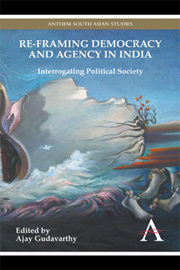Book contents
- Frontmatter
- Contents
- Preface and Acknowledgements
- List of Tables
- Chapter 1 Introduction: Why Interrogate Political Society?
- Part I Political Society and Protest Politics
- Part II Political Society, Middlemen and Mobility
- Part III Civil Society and/or Political Society
- Chapter 10 Clubbing Together: Village Clubs, Local NGOs and the Mediations of Political Society
- Chapter 11 Civic Anxieties and Dalit Democratic Culture: Balmikis in Delhi
- Chapter 12 The Habits of the Political Heart: Recovering Politics from Governmentality
- Chapter 13 Civil Society in the East and Some Dark Thoughts about the Prospects of Political Society
- Part IV Rejoinder
- List of Contributors
Chapter 10 - Clubbing Together: Village Clubs, Local NGOs and the Mediations of Political Society
from Part III - Civil Society and/or Political Society
Published online by Cambridge University Press: 05 June 2012
- Frontmatter
- Contents
- Preface and Acknowledgements
- List of Tables
- Chapter 1 Introduction: Why Interrogate Political Society?
- Part I Political Society and Protest Politics
- Part II Political Society, Middlemen and Mobility
- Part III Civil Society and/or Political Society
- Chapter 10 Clubbing Together: Village Clubs, Local NGOs and the Mediations of Political Society
- Chapter 11 Civic Anxieties and Dalit Democratic Culture: Balmikis in Delhi
- Chapter 12 The Habits of the Political Heart: Recovering Politics from Governmentality
- Chapter 13 Civil Society in the East and Some Dark Thoughts about the Prospects of Political Society
- Part IV Rejoinder
- List of Contributors
Summary
The notion of ‘political society’ that Partha Chatterjee presents most prominently in his book The Politics of the Governed (2004) has been formulated, developed and reformulated in a series of articles and book chapters. Here, I reflect on the dichotomy that Chatterjee draws between associations of civil and political society by considering its applicability to the way in which village clubs and small local NGOs operate in the Indian state of West Bengal, the region from which Partha Chatterjee's own examples are drawn. I demonstrate the multiple ways in which these associations are affected by and involved in the mediations of ‘political society’. However, I also argue that they simultaneously comply with many of the legalistic norms of ‘civil society’. The coexistence of these two seemingly contrasting modes of operating calls into question the viability of the dichotomy drawn by Chatterjee. Following Corbridge, Williams, Srivastava and Véron I therefore argue that, ‘like all binary distinctions, [Chatterjee's distinction between political and civil society] is also overdrawn’ (Corbridge et al. 2005, 256) and ‘can more reasonably be thought of as a set of interlocking political practices that are arranged along a continuum’ (Corbridge et al. 2005, 214); they are not so much separate worlds as overlapping norms and strategies.
The chapter is based on interviews conducted with the leaders of 94 local NGOs and village clubs in two districts of West Bengal.
- Type
- Chapter
- Information
- Re-framing Democracy and Agency in IndiaInterrogating Political Society, pp. 235 - 252Publisher: Anthem PressPrint publication year: 2012
- 5
- Cited by

